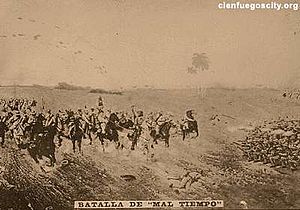Battle of Mal Tiempo facts for kids
Quick facts for kids Battle of Mal Tiempo |
|||||||
|---|---|---|---|---|---|---|---|
| Part of Cuban War of Independence and Invasion from East to West in Cuba | |||||||
 Máximo Gómez's cavalry charge during the battle |
|||||||
|
|||||||
| Belligerents | |||||||
| Commanders and leaders | |||||||
| Strength | |||||||
| 450 Cavalry | 2500 Infantry | ||||||
| Casualties and losses | |||||||
| 4 killed, 4 injured | 300 killed and wounded | ||||||
The Battle of Mal Tiempo was an important fight during the Cuban War of Independence. It happened on December 15, 1895, near a town called Cruces in Santa Clara Province, Cuba. In this battle, the Mambises (Cuban independence fighters) faced off against Spanish forces. The Cubans won this battle.
This victory was seen as one of the most important moments of the Invasion from East to West in Cuba. It had big effects on the politics, military plans, and economy, all helping the Cuban independence movement.
Template:TOC limit=3
Why the Battle Happened
This battle is known as one of the most famous events in Cuba's fight for freedom. It was led by two very important Cuban generals: Máximo Gómez and his second-in-command, Antonio Maceo. They commanded a group of brave Cuban patriots.
The Spanish general, Arsenio Martínez Campos, knew that the Cuban Liberation Army was moving west. He tried to stop them by gathering many Spanish troops in the Cruces area. This set the stage for the Battle of Mal Tiempo.
The Battle Unfolds
The area called Mal Tiempo was perfect for the Cubans to show their strong desire for freedom. The land itself, with its hills and features, helped the Cuban fighters. It was like nature gave them a gift to help them win.
General Máximo Gómez used his smart battle plans, and his soldiers fought with great courage. Maceo led the cavalry (soldiers on horseback) from the front. Gómez shouted, "To combat, long live free Cuba!" and the fighting began right away.
Eugenio Sánchez Agramonte, who was there, described the start of the battle:
250 riders charged like lightning. Their machetes were held high, and their reins were loose. They followed their undefeated General like a whirlwind. Gómez, sitting firmly on his horse, looked more like a half-human, half-horse creature than just a man.
José Miró Argenter, another witness, wrote about the Spanish soldiers' bravery:
The Spanish infantry stood firm, kneeling on the ground. They fought back with deadly gunfire and their bayonets (knives on the end of rifles). No one could get past them. Then, at the shout of "Let's go, Orientals, charge with machetes, long live Maceo!", the Cuban fighters broke through and attacked fiercely for fifteen minutes.
He added:
The fight didn't last much longer. Two full sections of Spanish soldiers fell, along with their officers. Groups of Spanish foot soldiers and horsemen were mixed up in confusion, falling to the Cuban sabers.
Enrique Loynaz del Castillo, who also fought in the battle, said:
The Mal Tiempo battle indirectly decided the outcome of the war. The final result didn't happen right away, but it cleared the way. It made the Invasion stronger and gave more spirit to the fighters. It also showed that even though Spanish soldiers were better armed and trained, they could be defeated by troops with less experience in open battle.
What Happened After the Battle
In the Battle of Mal Tiempo, the Cuban Liberation Army caused about 300 Spanish soldiers to be killed or wounded. The Cuban forces, however, had very few losses: only four killed and four wounded. This battle proved how good General Gómez's military plans were and how brave and ready his soldiers were to fight.
Many Cubans who worked in the sugar industry were inspired by the victory at Mal Tiempo. They stopped preparing for the sugar harvest and even took apart their sugar mill machines. The Cubans also captured weapons, ammunition, mules, and horses from the Spanish. This was a big financial blow to the Spanish in the area.
In the days after December 15, the Spanish Army suffered more defeats from the Cuban rebels. But the Battle of Mal Tiempo was especially important for the Cuban invasion to keep moving towards the western part of Cuba.
See also
 In Spanish: Batalla de Mal Tiempo para niños
In Spanish: Batalla de Mal Tiempo para niños
 | Sharif Bey |
 | Hale Woodruff |
 | Richmond Barthé |
 | Purvis Young |

